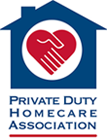The stresses of caregiving can be overwhelming, particularly if you feel you have little control over the situation, or you are in over your head. If these stresses are left unchecked, they can take a toll on your relationships, state of mind, health and eventually lead to caregiver burnout. It is difficult to do anything when you are burned out, especially take care of someone else. That is why taking care of yourself is a necessity. If you believe you are experiencing too much stress, consider the qualified services of a home health care business to take on some of your caregiving stressors.
Caregiver Burnout & Stress
Caregiver burnout is emotional, mental, and physical exhaustion resulting from the overwhelming and prolonged stress of caregiving. Although caring for an aging loved one can be extremely rewarding, it does involve stressors. As caring for a senior loved one is often long-term, the stressors it tends to generate can be damaging. It’s important to be mindful of these realities, and here are some guidelines that can you tell when your loved one needs more care than you can give them.
As a caregiver, if you do not receive the emotional and physical support you need, the stress of caring for your elderly relative can leave your susceptible to a variety of problems, including anxiety, depression, and eventually burn out. Both you can the individual you care for suffer when you get to that point. That is why managing stress levels early on is as crucial as ensuring that your family member is properly cared for. Regardless of how bleak your situation is or how stressful your caregiving responsibilities, there are several things you can do to avoid caregiver burnout and begin to feel hopeful and positive again.
Here are the five most common signs to watch out for that you are overwhelmed:
Learning to recognize the signs that you are overwhelmed can help to ensure that you take measures to deal with the problem and avoid burnout. Or, you can take action right away if you recognize that you have already hit your breaking point. Caregiving is no longer a healthy option for either of you once you burn out, so it is crucial to watch out for these common warning signs.
1. Your sleep is hurting – Does it take forever to fall asleep? Do you wake in the night? If so, this is one of the common signs of being overwhelmed.
2. You are unusually sad, irritable, or angry – Are you noticing that you are suddenly snapping at those you love, which is unusual for you? Do you lose patience with slow cashiers? When you are stretched to your breaking point already, it is difficult to remain in control of your emotions. In addition to burnout, irritability and mood swings are also signs of depression. (feelings of hopelessness or sadness, lack of energy, change in appetite, and loss of interest in things are also signs of depression.)
3. You are smoking or drinking more – At the end of the day, every day, do you feel as if you need two to three glasses of wine to unwind?
4. You no longer have time for personal care – Do you look into the mirror and think to yourself, “Look at my hair. When was the last time I brushed it?” Or, have you abandoned any attempt at an exercise routine?
5. You are constantly ill – Your immune system can be affected by stress. In fact, according to studies, a lowered immune response is seen among caregivers. Caregivers are more prone to ailments such as headaches, acid reflux, and aches and pains.
Respite Care
There are numerous strategies for dealing with caregiver stress including accepting help, set realistic goals, join a support group, seek social support, set personal health goals, and more.
One common way to help manage caregiver stress is respite care. While it might be difficult imagining leaving your senior loved with someone else, taking a break could be one of the best things you can do for both of you. Some of the respite care available in most communities include:
• In-home respite from a home health care business.
• Adult care centers that provide care to both elderly and disabled individuals.
• Short-term nursing home care that accepts elderly loved ones for short stays while the caregiver is away.
If any of these five signs to watch out for sound familiar, it may be time to look for solutions. It might be one of the answers stated such as joining a support group or looking into respite care for a few hours a week, month, or even day. You are not alone.




